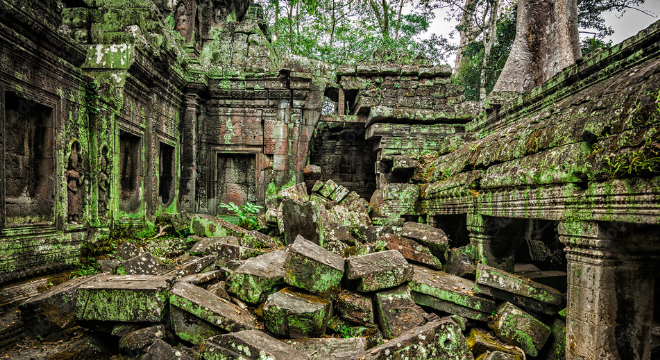Reflecting on Ruins

Ruins are intriguing. Whether ancient Greece or abandoned factories in Detroit they seem to stir wonder within one who visits or even sees photos of them. Ruins take us to a place and remind us of a time that has since fallen into decay. They stand as a testament to those who have come before us and left their mark on the world. Ruins also stand as a warning; they are evidence of a very real and possible fate of our own hopes and dreams. They perhaps speak as much of the future as they do of the past. We see ancient stones standing as an echo of a once vibrant community and I can’t help but wonder to myself what in our own world might last like these stones. The workmanship of what remains often judges the new among which we live. We see in the ruins both the reality and promise of entropy as well as what little remains of a life and civilization distilled by time.
Ruins are excavated to tell us of the civilizations that once lived among them. Archaeologists dig and dust among the remaining scraps from ancient peoples and their villages or towns to find their stories. Sometimes there is an actual physical treasure to be found but more often than not the treasure being sought is the stories from the lives of the people themselves. The remains among their world laid waste tell us about that world that was wasted. We mine these historic communities to learn whatever they have to offer us. Be it their tools and knowledge or a warning against facing a similar end ourselves.
CNN posted a story several years ago entitled “Trash or Treasure?” about archaeologists sifting through ancient rubbish piles. While we may not immediately think about the trash heaps when we consider the ruins of civilizations from history, those who look to find out information about the people do. Just think about how much one might learn from our trash piles. If any of us saw someone outside our houses digging through our trash cans we would feel violated and exposed because we know how much one might learn about us from them. Archaeologists know the same thing about the value of people's waste. In Spring of 2012 The Peabody Museum hosted a series of talks and events entitled “Trash Talk: The Anthropology of Waste” on the importance of trash to our understanding of human behavior of the past as well as of the present.
I shudder when I think about the story that our remains might tell about our own civilization. If I imagine our nation being excavated in some post-apocalyptic future I wonder what conclusions might be drawn about us. What would be made of the huge cages full of more human beings than any other place on our planet? What might one deduce from neighborhoods full of packed houses, liquor stores, and pawn shops while the other side of what seems to have been an interstate is gated communities of really spread out McMansions filled with traces of wealth? Would our remains tell about our segregated cities and churches? Would they expose our neglect for the poor and our planet? Would our trash dumps reveal our untempered consumption and our culture of obsolescence? What story might be told by our remains, ruins, and refuse? What might the future archaeologists conclude about what we actually value?
May these questions serve as points for reflection as you walk your streets this week. May they bring our most basic, everyday decisions to our conscious attention. Until next time, be pedestrian.
